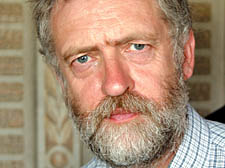|
|
 |
| |

Jeremy Corbyn |
Sadly, Ken lost the mayoral contest on national policies
Jeremy Corbyn pays tribute to Ken Livingstone and laments that the Labour Party may have been one of the main reasons for his defeat
LAST week’s election results were dramatic. Ken Livingston lost the mayorality of London, Labour gained one seat on the assembly, UKIP lost two, and the BNP, sadly, gained one. There was huge interest in the election, with far more TV and radio coverage than ever before. Most of the broadcast media attempted to give a balanced debate at least between the three main candidates.
The weekend’s headlines were all full of the news that Ken Livingstone had lost the mayorality of London. While Ken did lose, he polled 47 per cent of the London vote in the final ballot, 300,000 more than in 2004, and received a far higher vote than the Labour Party did in local elections outside London in England and Wales. Thus, he bucked the trend of the Labour Party almost enough to hold on to the position of mayor.
London is not going to be the same without Ken Livingstone as mayor. We should congratulate Ken on many achievements, both as leader of the Greater London Council from 1981 to 86, and as the first elected Mayor of London for the last eight years.
During the election in 2000 he promised a congestion charge to improve public transport, and, despite all the pressures, he carried it out. This has resulted in less traffic, less congestion, cleaner air, and much faster public transport.
London is the only capital city to achieve this level of success! After which Ken was given control of London Underground and now, some overall rail services.
He’s also been able to persuade central government to invest large amounts of money in improving our infrastructure, including Crossrail and the East London Line.
Nobody should forget the battle with Treasury orthodoxy on Private Public Partnership, over his preferred option of a bond scheme to raise the necessary capital to refurbish the Underground. The collapse of Metronet and the cost of this to the public shows the folly of the Treasury option compared to his own.
As the overall planning authority for London, Ken achieved a great deal in setting a benchmark of 50 per cent of all developments to be “affordable” and, while this proved very difficult to achieve, he was demanding family housing, and a substantial proportion of council or housing association rented property in new developments. As of this April, the government has given increased housing investment powers to the mayor.
Ken has done a great deal to present London as a multicultural, anti-racist city, with an improving environment and a vibrant, urban metropolis.
It should be acknowledged that Ken has succeeded in reclaiming a lot of street space for pedestrians, including the remodelling of Trafalgar Square, and started on a programme of ending the environmentally disastrous one-way systems.
Wouldn’t it be wonderful if one day Camden High Street became a normal road, and the racetrack of Seven Sisters Road/Isledon Road reverted to being a normal London road via a two-way system?
Nobody can forget the way in which Ken spoke for all of London after the disastrous day of 7/7, when he extolled the virtues of a multicultural city that was going to pull together.
He also strongly opposed the Iraq war, and the policies behind it.
During the election campaign, it became very obvious that the sustained media barrage against Ken by the Evening Standard had affected the popular perception of the mayor.
However, Labour lost the mayorality in London, essentially on national policies. The abolition of the 10p taxation rate envisaged in last year’s budget was opposed by a small number of Labour MPs at the time, and raised again during this year’s budget debate.
Labour in government has managed to do a great deal to help the poorest people in the country through a national minimum wage and tax credits, but by abolishing the 10p rate it has made a substantial section of the population worse off.
Determined parliamentary action will, I am sure, provide restitution for these people, but the damage was done during the election campaign by this decision regarding the abolition of the 10p tax rate.
At the same time, the lack of a much higher rate of taxation for very big earners means that the gap between the rich and poor is widening.
The lessons for Labour are that in London we have a good tale to tell of trying to defend communities, and improve urban life for many people. The gain of a Labour seat in Brent and Harrow and the majority stacked up by Jennette Arnold in North East London shows that the Labour Party has enormous strength on the ground.
Boris Johnson made a series of contradictory and uncosted promises during the election campaign, for example on bendy buses and police funding, and in his opening speech to assembly staff in City Hall, he set out his priorities, which seem to be an agenda of fighting crime, to which we can all agree, and protecting suburban gardens.
While I have no wish to see overdevelopment, the constituency I represent has massive problems of young families stuck in overcrowded council flats, overpriced private rented accommodation and the inability of purchasing anything on the open market for many of my constituents. I want a London mayor that loves the city, understands its social problems, and is prepared to use the powers at their disposal to solve them.
|
 |
|
| |
|
 |
|